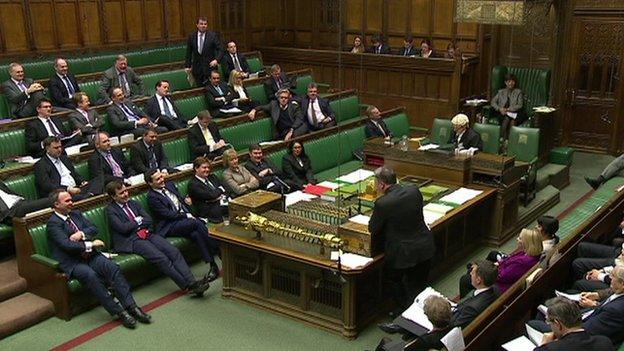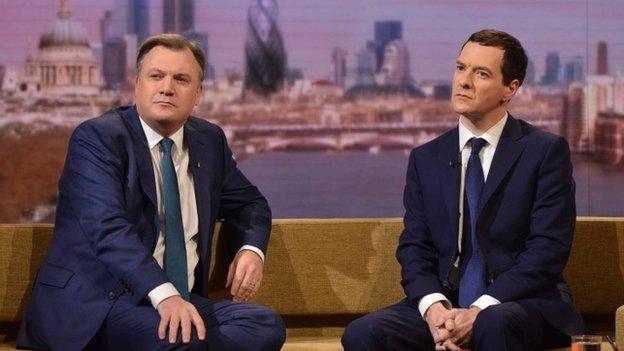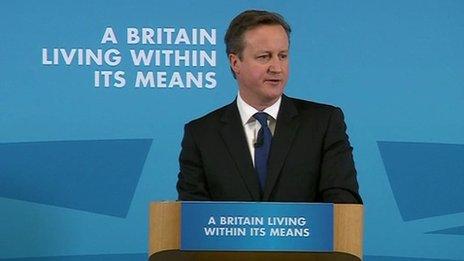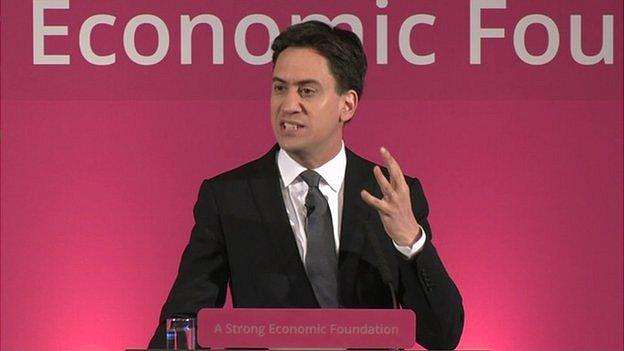George Osborne's budget charter approved by MPs
- Published

MPs have voted in favour of setting new binding targets on public spending.
Despite calling it a "gimmick", Labour backed the Charter for Budget Responsibility, saying it was "fully consistent" with its approach.
But as the parties clashed over spending plans, Chancellor George Osborne said Labour would create "a tax bombshell or a borrowing bombshell".
Earlier, the Institute for Fiscal Studies said voters faced a "stark choice" between the parties.
When the charter was unveiled by the government in December, it prompted a row between the Tories and Labour over their spending plans, with both sides accusing each other of shifting their deficit reduction targets.
'Grossly unfair'
It commits the government to a goal of balancing day-to-day spending - the structural current deficit - by 2017-18.
It would also ensure that debt is falling as a percentage of Gross Domestic Product (GDP) by 2016-17.
The Treasury says that to meet these targets a new government would have to make additional tax rises or spending cuts of around £30bn - more than Labour plans.
But Labour says the targets match its plans to eradicate the current deficit "as soon as possible" in the next parliament.
In the Commons, Mr Osborne said the government had neither gone faster nor slower than it said it would on deficit reduction, and said Labour would borrow more than the Conservatives after 2015.
But Mr Balls said Mr Osborne had "flat lined" the economy and missed his target to balance the books in 2015-16.
Lib Dem Chief Secretary to the Treasury Danny Alexander criticised Labour's record but added that the Conservative Party's plan to eliminate the deficit with spending cuts alone was "grossly unfair".
"Taxes on the wealthy should, and must, play a significant part," he added.
'Big difference'
Mr Osborne referred to comments by the IFS that a future Labour government could add £170bn to the national debt by 2030 based on its spending plans.
IFS director Paul Johnson said, external Labour's plan to ease spending cuts could require borrowing of up to £50bn a year more by 2020 than the Conservatives.
This could hamper the UK's ability to cope with a future recession, he said.

The IFS says voters face a stark contrast between the spending plans on offer by the two parties
The Conservatives have pledged to balance the government's overall spending, covering current and capital spending, while Labour has promised to balance day-to-day spending but borrow for investment.
In an analysis of the parties' plans for government, Mr Johnson said voters faced a stark choice between the two parties.
He said the Tories planned to scale back public spending by at least £33bn, while Labour planned cuts of £7bn.
"Lest there be any doubt, there is a big difference between £7bn of cuts and £33bn of cuts," he said.
"If you take the plans set out in the autumn statement at face value, spending cuts of more than £50bn could be required after 2015-16."
And the economist sounded a warning about the long-term risks of adding to the nation's debt.
"The problem is that another recession will strike one day. Going into a new recession with debt still high - and it is higher now than at any time since the late 1960s - could leave less room for manoeuvre.
"The sort of additional borrowing that we are able to support as we made our way through the recent period might not be as easily financed."
Mr Johnson said that even if Labour kept cuts to a minimum in the next Parliament, further tax rises or spending cuts "might prove necessary down the line to reduce risks with the long-term state of the public finances further".
Labour dismissed the IFS's prediction as being based on a "ludicrous assumption" about what it would do beyond 2020.
A spokesman said: "Labour will cut the deficit every year and get the current budget into surplus, and national debt as a share of GDP falling, as soon as possible in the next parliament."
Conservative plans
Mr Johnson, director of the economic think-tank, also warned that the spending cuts proposed by the Conservatives would be tough to deliver.
David Cameron has committed his party to running an overall budget surplus by the end of the next Parliament through a combination of cutting spending and waste, rather than tax rises.
In a speech on Monday, Mr Cameron warned against passing on a "legacy of debt" to future generations.
Mr Johnson said: "Under the Autumn Statement plans, Conservatives could be cutting unprotected budgets by 26% after 2015-16 - or an extraordinary 41% over the period from 2010.
"Even just to meet their more modest fiscal target, these budgets would need to be cut by more than 15% after 2015/16.
"Labour would need to implement cuts of just 3%."
- Published12 January 2015

- Published11 December 2014

- Published15 December 2014
- Published19 March 2013
